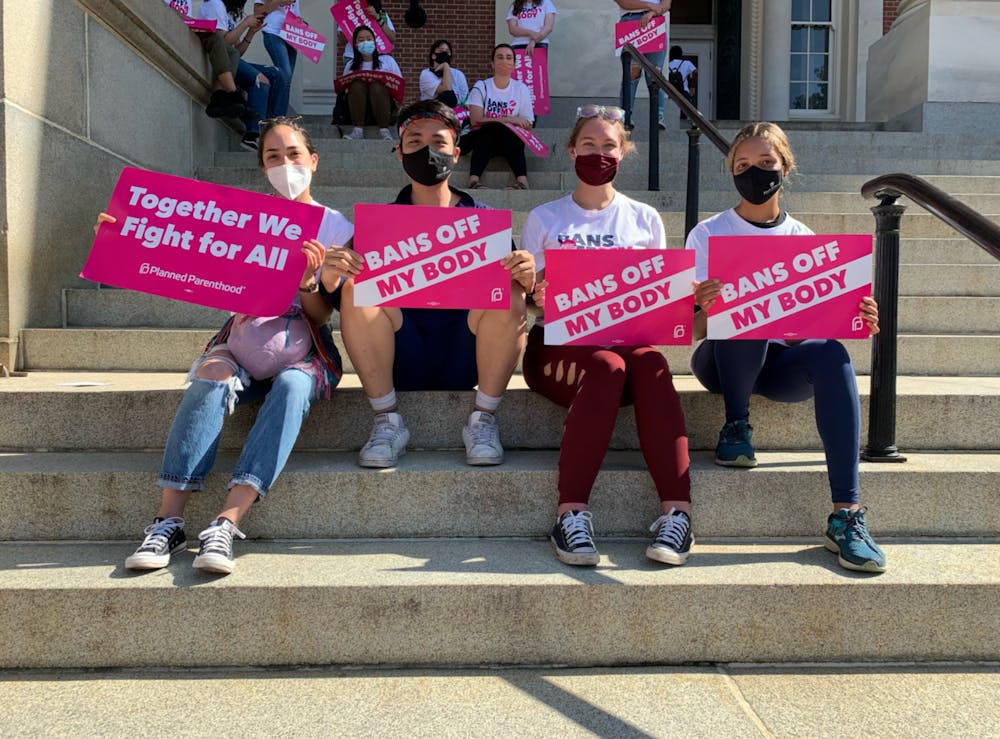People crowded Annapolis City Hall to defend and demand expansion of Maryland’s abortion and reproductive rights on Oct. 2.
The Women’s March on Annapolis was in response to restrictive measures in other states like the six-week abortion ban in Texas, which prohibited abortions of pregnancy as early as six weeks and allowed citizens to sue abortion providers and others involved in the process. On Oct. 6, a federal judge in Texas paused the ban temporarily; however, its future still remains uncertain.
Hopkins students participated in the march, where they listened to speakers in front of city hall, chanted, held up posters and conversed with politicians about the issue. Many of the attendees were members of the Advocates for Reproductive and Sexual Health (ARSH). In interviews with The News-Letter, members of ARSH reflected on their experiences at the rally.
In an email to The News-Letter, President of ARSH Melanie Alfonzo-Horowitz stated that the march demonstrated that women are not afraid to fight for what they believe in.
“It was amazing to see the thousands of people across the US come together to ensure that the progress we made for women’s rights and reproductive equity does not fade away,” she wrote.
Alfonzo-Horowitz explained that this march called to attention that women’s rights are in danger of being revoked, erasing all progress that has been made since the 1970s. She asserted that outlawing abortion is dangerous and will lead to abortions occurring in dangerous settings, putting lives at risk.
She added that she decided to attend this event after attending her first Women’s March in January 2017.
“This event was important to me so that I could show support to my fellow females, listen to stories, learn how to act to enact positive change, and also encourage others to do the same,” she wrote. “You don’t have to identify as a woman to support the cause, anyone who cares should be a part of it.”
In an email to The News-Letter, Thanh Doan, another member of ARSH, emphasized the importance of the march.
“This march is a timely and vital response to the recent Texas ban on abortions,” he wrote. “Reproductive rights should concern everyone. Beyond being parents, siblings, community members and more, menstruators are individuals with intersectional identities and inherent rights to their own bodies.”
In addition to Texas’ legislative actions, the rally also shed light on the ongoing controversy over the constitutionality of Roe v. Wade, the court case that set the landscape for U.S. abortion laws.
Alfonzo-Horowitz noted that in 2021 there had been the most threats to Roe v. Wade in terms of the number of legislations aiming to reverse it. She discussed the connection of the rally to Roe v. Wade.
“Attending the march showed the pure unconstitutionality of reversing Roe v. Wade and highlighted the number of people who support this precedent and the ability for women to decide what happens to their bodies,” she wrote.
Alfonzo-Horowitz stressed the importance of staying updated on rapidly evolving issues like the abortion legislation in Texas or the trials concerning Roe v. Wade. She also pointed out ways students can remain aware and contribute to protecting reproductive rights and abortion care for all women.
“Join ARSH! In each meeting, we have ‘politics updates’ in which we discuss current events related to reproductive health,” she wrote. “Other ways are to read or listen to the news, an unbiased source would be ideal, or join like-minded organizations such as Planned Parenthood and NARAL where you can volunteer in any capacity or sign up for newsletters.”
She added that she hopes people use this as an example to become civically engaged in whatever capacity they are able.





